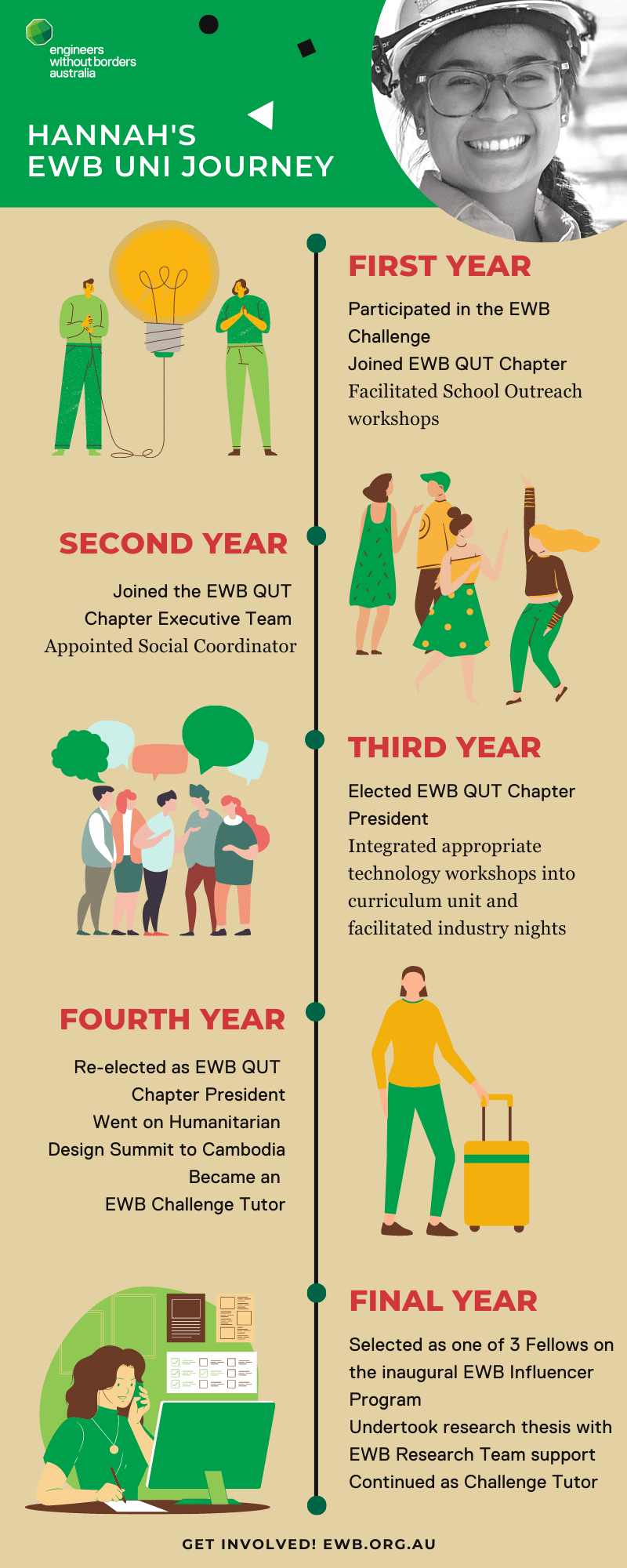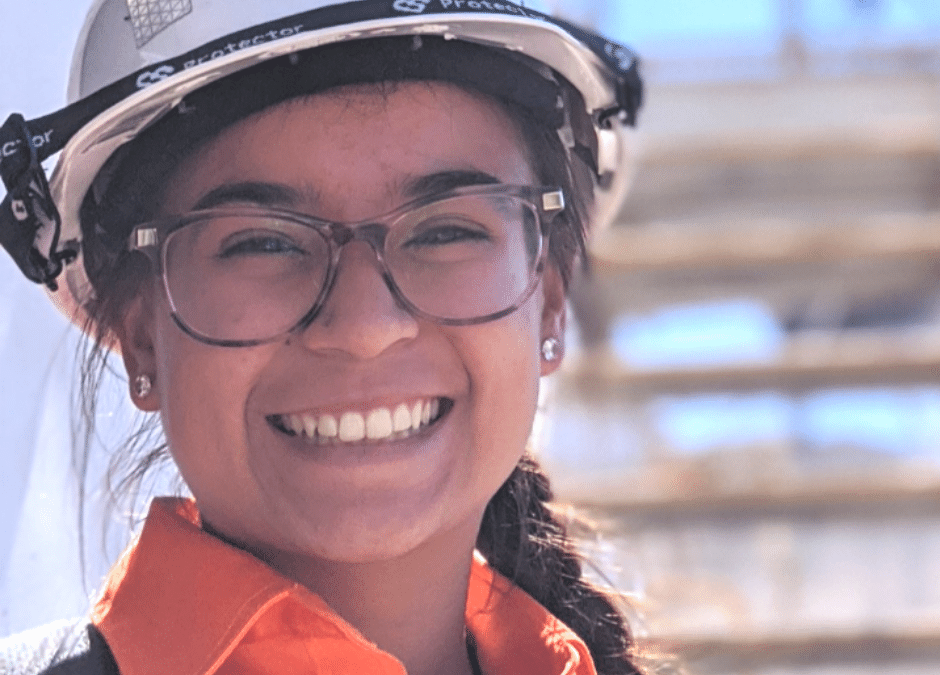When Hannah was seven years old, she had a massive pet hate. Traffic lights. Being driven around in the backseat of the family car, the need to stop at a traffic light was always a source of frustration. Why did you need to wait for so long? There’s no traffic coming, yet we still have to wait? Can’t the council workers design these things better?!
A few years later and tasked with a school assignment to form a political party, Hannah’s campaign platform was clear – why don’t we just install roundabouts everywhere, so the traffic can be so much more efficient? It wasn’t until Hannah was well into high school that she realised it wasn’t the council workers fault.
It was the job of a civil engineer.
Terrible traffic lights sparked a curiosity for how infrastructure connects and improves the lives of everyday people, and ignited a desire in Hannah to change the world she saw around her. Her high school maths teacher (a mechanical engineering graduate) suggested that engineering was the perfect blend of science and problem-solving. Her undergraduate degree was decided!
The early days at Uni
In Year 12 maths, Hannah enjoyed learning with a diverse cohort of 50/50 male/female students. On the first day of her first engineering unit at Queensland University of Technology (QUT), the contrast could not have been more stark.
“I kid you not,” says Hannah, ”I walked into a full lecture theatre of around 600 students and I could count ten girls – all sitting in the same rows! It was very intimidating.”
Those first few months at uni were a struggle. It was a challenge to find ‘her people’. But when Hannah discovered the EWB QUT Chapter, she felt like she’d found her place. At least half of the members were female engineering students – they were like-minded, and they shared her passion for making change. “I also felt comfortable expressing my views without being spoken over, which can happen when you’re in a tutorial group with six guys and you’re the only girl. The EWB Chapter felt like a safe space,” says Hannah.
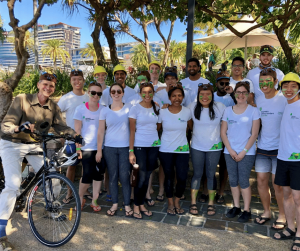
Hannah with her EWB QUT Chapter crew.
As an eager new recruit of EWB’s QUT Chapter, Hannah started attending events and participating in the delivery of School Outreach workshops. As someone who loves kids, she welcomed the opportunity to give children an engineering ‘taster’ – an experience she’d wished she’d had in her own early years.
The School Outreach workshops proved to be some of the most fulfilling activities that Hannah was a part of. As a program that reaches out to thousands of rural and remote primary and secondary students each year, it is one of the most impactful programs led by EWB university chapter members.
At one school Hannah facilitated at, student twins were frequently removed from class because they were disruptive. In fact, the school Hannah met them at was just one in a succession they had attended. In an EWB School Outreach workshop, Hannah set them a task that asked for them to be as creative as they could be. The twins’ response to the challenge was transformative.
“The twins just rose to the challenge – they really shone. It was great to see the change in not only them, but also in their educators. It really empowered the teachers to see how they might nurture the potential of these more challenging students. It demonstrated the power that every one of us has in helping others, and the opportunity that engineering presents. As a skill, engineering is quite broad, and gives great scope to tap into a whole range of personal attributes. Some of the best engineers use their social skills, their creativity, their attention to detail, their ability to communicate, to get much better outcomes,” says Hannah.
Buoyed by her experiences at the EWB QUT Chapter, Hannah helped to further shape its vision. When elected President, Hannah integrated the Appropriate Technology workshop that the Chapter conducted into QUT’s Humanitarian Engineering curriculum. It enabled more students to be exposed to EWB on a personal level – and to reflect on the kind of impact they could make in their engineering career.
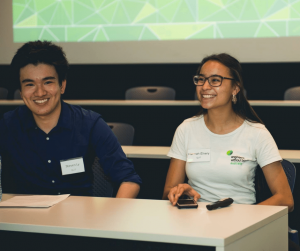
Hannah at a Humanitarian Engineering panel night hosted by EWB’s QUT Chapter.
“To be a part of a network of people that are like-minded and that want to see change is really empowering. EWB shines a light on there being more to engineering beyond the pursuit of a career, that you can do more with the skills you have. EWB helps you understand that other people’s lives matter,” says Hannah.
The Cambodian circuit breaker
Heading to Cambodia on an EWB Humanitarian Design Summit really solidified this for Hannah. Meeting local communities and exploring solutions for challenges experienced by rural Cambodians fuelled her passion to support others. Responding to a brief, the team that Hannah was a part of created a simple design which used readily available and affordable materials. Local leaders from islands around the Mekong came to Kratie to review the groups’ designs, and it was exciting to show them how to wire a circuit breaker!
As with so many undergraduates who attend these study tours, Hannah’s engineering vision shifted. The Design Summit firmed up her life’s purpose. With most uni students feeling they need to steer life post-uni on a linear, 40-year conventional career plan, Hannah felt sure there was another way.
“Getting a dream job, climbing the ladder, becoming an expert in your field… that’s not for everybody. That’s not for me. I really want more from my career. I started to think about what I might have to sacrifice to do the kind of work I wanted to do. Did I have to forgo the ‘dream job’? The EWB Influencer Fellowship program has really helped define this for me,” says Hannah.
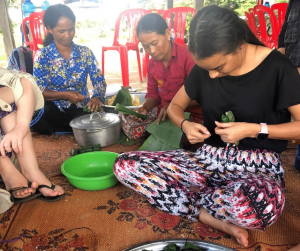
Hannah on the EWB Humanitarian Design Summit in Cambodia.
A landslide victory
For her final year thesis Hannah was determined to explore a topic grounded in Humanitarian Engineering. With an interest in geotechnical engineering, Hannah decided to take a look at landslides. Her first thought was researching this in the Australian context, but after her time in Cambodia, focusing this study in a more international context held greater appeal. Whilst this thesis subject wasn’t on the list of EWB Final Year Research topic offerings, Hannah reached out to the EWB Research team anyway to see what was possible.
Not only was it possible – it also led to an invitation to be mentored as part of the inaugural 2020 EWB Influencer Fellowship program, of which only three students, who show a great capacity to address inequality and sustainability, are selected.
Alison Stoakley, EWB’s Education Senior Manager, was Hannah’s lead mentor on the year-long program.
“Ali has been a real inspiration. Her story of her engineering journey and how she hasn’t let obstacles sway her passion, is amazing. Working alongside Ali during the Influencer Fellowship has instilled confidence in me about how I can navigate my career. I’ve learnt how I should always be reflecting on what opportunities there are, and that there are always open doors for us to help other people. We explored how, in our workplaces, we can make change. I’ve now got great tools to engage with various stakeholders, and to help me make decisions – this has been amazing for me as I find it really hard to make decisions! I know that I might pick wrong doors, but now I know where to start back from,” says Hannah.
After graduation, Hannah will start work at BHP as a graduate engineer, requiring her to move to their company’s rural Queensland base. Hannah sees EWB as a really important support network, and plans to continue her EWB work as soon as she settles in.
“Without the EWB network, I think I would feel lost. EWB is the place to be. Just sayin’!” adds Hannah.
We’re pretty sure that would look great on a t-shirt.
Just sayin’.
Find out more about the EWB Influencer Fellowship here.
